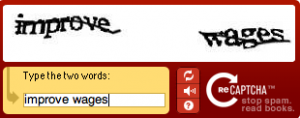Online advertisements are immensely popular with website owners, but are often unwanted by users. Nobody wants to see a 30-second advertisement in order to be able to watch a two-minute video, and nobody likes pop-ups with deliberately hidden “close” buttons. Apart from that, advertisements slow down the sites’ loading process, drain one’s mobile phone’s data limit, and are an additional vulnerability through which malware can enter the device. As a result, a growing number of people resort to installing ad blockers on their devices. This puts the ad industry in a dilemma. New ideas are needed.
The internet is free. A lot of people take this for granted. However, many people forget that hosting a website costs money, and that the hosts need to finance them somehow. Many websites that are not paid for out of the pocket of the person in charge therefore resort to asking for donations, premium memberships, sell their users’ data, or let companies place advertisements on their website.

While the global revenue from online advertisement is still experiencing a steep increase, so is the market for ad blockers. In the past year, the ad blockers’ user count has increased by 48%, and for 2016, experts have projected a loss of $21.3 billion in online advertisement revenue through the usage of ad blockers – and these figures only account for the United States. The global user amounts may still be quite low, but the pressure on the online industry is growing.
When the German tabloid BILD, the largest newspaper in Germany, decided a couple of weeks ago to exclude all users running ad blockers from the otherwise free content on their website, and offering a subscription-based service disabling all ads as an alternative, it caused a huge outrage among the German online community. While some showed understanding for the tabloid’s decision, the overall reaction was rather negative. Some people got creative and wrote scripts that circumvent BILDs technical blockades, or plugins that would prevent you from entering the BILD website ever again.

Not knowing how to deal with the backlash, BILD started to sue against people offering advice on how to circumvent the tabloid’s technical blockade. As a result of the ensuing Streisand Effect, people only became more conscious about the existence of ad blockers and the ways in which one can circumvent BILD’s security.
Even without the ad blockers, a lot of money is being wasted on online advertisement. Internet giant Google, whose revenue stems by 90% from its ad sales, admitted last year that only about 56% of all ads embedded on a website ever get seen for more than one second. Another report by Google-owned Spider.io pointed out that a lot of these ad views were generated by infected computers organised in botnets.
The underlying issue is that everything nowadays is geared towards ad revenue. New solutions must be found. Duolingo, the largest language learning website in the world, is entirely free for its users, without resorting to ad sales or selling user data. Instead, the company lets users practice their newly-acquired language skills through the translation of articles – a service for which the articles’ authors pay a sum to Duolingo. The site has partnered up with CNN and Buzzfeed, for whom Duolingo has users translate articles for their international editions.

Duolingo was created by Guatemalan Luis von Ahn, who is also the founder of ReCAPTCHA, an anti-bot tool. Just like Duolingo, ReCAPTCHA uses an alternative business model. Every time users enter a word in order to verify themselves as humans, they help transcribe book and article scans for the website’s clients. The idea behind Duolingo and ReCAPTCHA impressed the internet giants, and Google has since acquired ReCAPTCHA for its own services, and holds a $45 million stake in Duolingo through its investment branch Google Ventures.
Now, Google lets people transcribe books word by word for its Books service, addresses for Google Earth, and articles from the New York Times’ archives, and improves its image recognition algorithms through the displaying of similarly-themed pictures, from which people have to sort the odd man out. However, Google has since drawn criticism for its involvement in ReCAPTCHA. In the beginning of 2015, a woman sued Google in a class-action lawsuit, alleging that Google outsources unpaid labour to its users and thus generating significant revenue and improvement of its services.
In any case, the rise of ad blockers will continue, and website owners will be more and more pressed to seek other business models for their websites. Duolingo and ReCAPTCHA are just two examples of how websites could be financed in the future – one only needs some fantasy.
By Michael Schätzlein
Image credit:
Picture 1: Yuya Sekiguchi, licensed under CC BY 2.0
Picture 2: Hernán Piñera, licensed under CC BY-SA 2.0
Picture 3: Matt Hampel, licensed under CC BY 2.0










